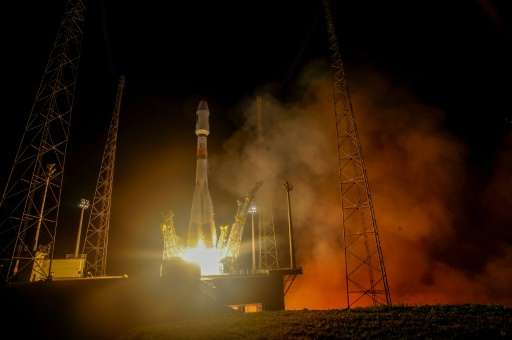Europe readies for satellite launch, moves closer to own satnav

Europe is set to launch the next two satellites Thursday for its multi-billion-euro Galileo satnav system, a rival to America's GPS, according to space firm Arianespace.
This would bring Europe a step closer to providing initial navigation services by next year, Arianespace chief executive Stephane Israel told AFP, after many years of frustrating delays.
"The programme is truly on track, moving forward, keeping its promises," he said.
Weather permitting, a Russian Soyuz rocket will launch the satellite pair—numbers 11 and 12 in the Galileo constellation orbiting Earth—from Europe's spaceport in Kourou, French Guiana, at 1151 GMT.
The project should ultimately comprise 30 orbiters, including a number of spares.
Initial services can start once 16 are in place—hopefully after a four-satellite launch in the second half of 2016, said Israel.
The project, which will also provide crucial search-and-rescue services, has been plagued by delays, technical glitches and budgetary difficulties.
The launch of orbiters seven and eight in March this year was about three months late to allow for a probe into an August 2014 mishap that sent satellites five and six into a lopsided, elliptical orbit.
The pair have since been manoeuvred into a better, more circular path.
The mishap was blamed on frozen fuel pipes on board the Soyuz rocket's fourth stage, called Fregat—a problem the European Space Agency says has since been fixed.
The launch of satellites five and six, meant to have been the first fully operational Galileo orbiters, had itself been delayed by more than a year due to "technical difficulties".
The first four orbiters were launched in 2011 and 2012.
The European Commission has budgeted seven billion euros for the project until 2020.
The remaining satellites will be launched using a combination of Soyuz rockets, which can take two into space at a time, and Europe's own Ariane 5 ES launcher, which is being adapted to handle four.
The first Ariane launch is scheduled for be next year, followed by one each in 2017 and 2018.
There will be one Soyuz launch in 2018 as well—bringing the total to 26 satellites, sufficient for full operation.
A decision on further additions will be taken next year.
© 2015 AFP





















